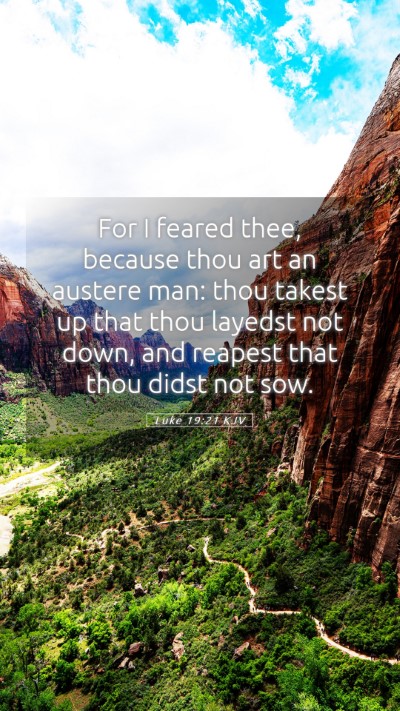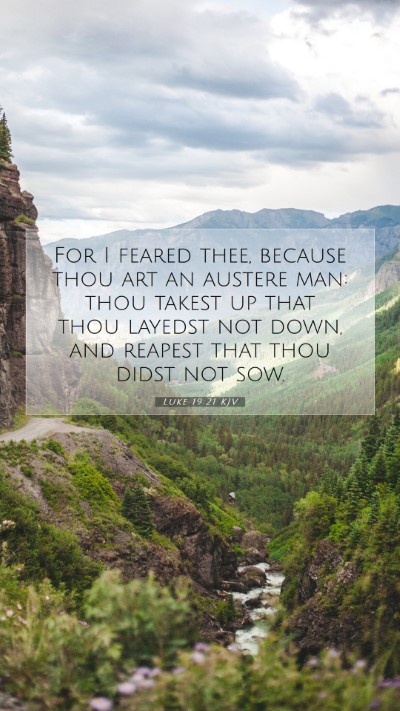Meaning and Commentary on Luke 19:21
Luke 19:21 states, "For I feared thee, because thou art an austere man: thou takest up that thou layest not down, and reapest that thou didst not sow." This verse appears in the context of the Parable of the Ten Minas, where a nobleman gives his servants money to invest while he goes away to receive a kingdom. Upon his return, he evaluates their stewardship.
Bible Verse Meanings
This verse reflects a servant's fear of his master's strict nature. Three esteemed commentaries provide valuable insights into this passage:
- Matthew Henry: Henry emphasizes that this servant misinterprets his lord's character. His fear led to inactivity, representing a failure to make proactive use of the resources entrusted to him. Henry suggests that a true understanding of God as just should stimulate rather than paralyze our efforts in serving Him.
- Albert Barnes: Barnes notes that the servant's description of the master as 'austere' indicates a misunderstanding of divine justice. He is critical of the servant's apprehension, suggesting that fear should not paralyze an individual's ability to act. Instead, one must be motivated to act wisely and diligently with what has been given.
- Adam Clarke: Clarke elaborates on the servant's psychology, stating that his false perception of the master led to unjustified self-excuse for his lack of action. Clarke argues that the fear of the lord should lead to reverence and action, not apathy or shame.
Combined Insights
The combined insights reveal essential themes of understanding God’s character and how our perceptions shape our actions. Fear rooted in misunderstanding can lead to inaction, whereas a proper understanding of Scripture invites us to be diligent.
Key Themes in Luke 19:21
- The Nature of God: Understanding the true character of God is vital. Misconceptions about God can mislead individuals into fear-based paralysis.
- Stewardship and Accountability: Each servant is accountable for their actions. The expectations of God’s kingdom involve active participation and productive use of one’s gifts.
- The Role of Fear: While fear can be a natural response, it should motivate us to act righteously rather than leading us to inaction.
Application to Daily Life
For believers today, this verse teaches that understanding God correctly encourages fruitful action. It challenges us to reflect on how we view our responsibilities and encourages active engagement rather than fear-induced stagnation.
Cross References
- Matthew 25:14-30: The Parable of Talents highlights similar themes of stewardship and accountability.
- Luke 12:47-48: This passage discusses the expectation of behavior in knowing the master’s will.
- 2 Timothy 1:7: This verse emphasizes that God has not given us a spirit of fear, but of power, love, and a sound mind.
Conclusion
Understanding Luke 19:21 through various biblical commentaries provides a deeper insight into the nature of stewardship in faith. It encourages us to correct our perceptions about God and to act faithfully in our callings. Allegiance to Christ invites diligent investment in our lives, for we will all give an account for our actions.
Additional Resources for Bible Study
For those seeking to explore these themes further, consider engaging with the following:
- Bible study guides that focus on parables.
- Online Bible study groups for discussion on stewardship.
- Bible study tools to facilitate deeper scripture analysis.
These actions will promote a better understanding of Scripture and its applications in daily life. By utilizing the plethora of Bible study resources available, believers can enhance their Bible verse understanding and interpretations significantly.


